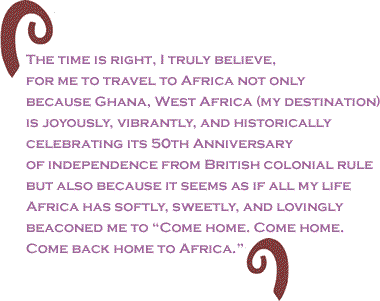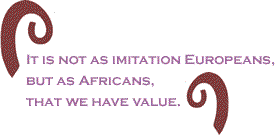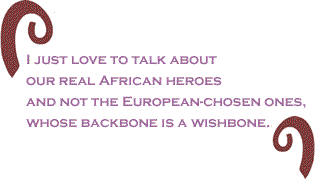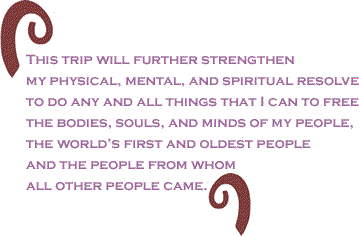
|
|||||||||||||||||||||
|
The current issue is always free to everyone If
you need the access available to a |
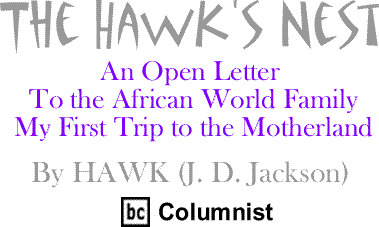 |
 |
Greetings, (1) billion-plus members of the African World Family. By the time many of you read this, brothers and sisters, I, hopefully, will have made a successful, safe and sound landing in none other than the place that serves first and foremost as both the birthplace of humanity and human civilization and as the world’s richest continent—Africa. Of course, I wholeheartedly solicit your heart-felt positive prayers in that endeavor, my travels while there, and my safe and sound return back here to the States. This will be my first trip to the Motherland. In short, it is a long-time dream of mine coming true. Hopefully, it will not be my last but the first of many. With open arms, an open mind, and an open heart and soul, I welcome any and all of the countless life lessons that I will learn from the infinite sights and sounds and people - young and old, most especially the Elders - our people, African people, who I will encounter and meet and greet during my short stay there. To me, the time for such a trip is right. It’s right to make what I define as a godly journey, a sacred sojourn, and a positive pilgrimage to where time, life, and love all began. Why, you may ask. Here’s my answer. The time is right, I truly believe, for me to travel to Africa not only because Ghana, West Africa (my destination) is joyously, vibrantly, and historically celebrating its 50th Anniversary of independence from British colonial rule but also because it seems as if all my life Africa has softly, sweetly, and lovingly beaconed me to “Come home. Come home. Come back home to Africa.” Now, it is time for me to answer the beacon and to do so in the affirmative physically as I mostly always have in my life spiritually and mentally. Due to what I consider my sacred choice in the positive to finance, though not without financial sacrifice, and to make the trip with the full blessings of family and friends alike, my heart swells and my soul smiles fully.
For longer than I can remember, I have felt exactly like the wise words expressed by the legendary African American freedom fighter Paul Leroy Robeson. As an aside, nearly a decade ago, I had the distinct pleasure and honor of conceptualizing and solo-performing vocally in a (20)-plus song concert in his honor at the historic 16th Baptist Church (scene of the 1963 anti-black, terrorist church bombing). That pleasure and honor were both deepened and widened by my later meeting and singing in the presence of Mr. Robeson’s son, Paul, Jr., who publicly stated that he was well-pleased with my performance of a select few of his father’s most-memorable musical selections, especially “Ol’ Man River”. Historically, Robeson turned “Ol’ Man River”, once a very racist song, into a powerful, soul-stirring freedom fighting one by slightly changing the words. Yet it was the words that he wrote in 1934 that have stuck with me since the 1980s, if not before. In an essay that he wrote for a publication entitled What I Want From Life, this man, Paul Robeson - a late but great all-star athlete and one of the first Blacks to play in professional football, a Phi Beta Kappa member of and the valedictorian for his graduating class at Rutgers College (now a university), a graduate of Columbia Law School and short-lived practicing lawyer, a man who was (and still is) to many an international star of the theatrical stage and the silver screen, the concert hall and the recording studio; a man who was a multi-linguist who spoke over (25) different languages and a multi-genius, not to mention a globetrotting scholar-activist, and, in my humble opinion, the real Superman—penned these provocative, powerful, and timely words: At present the younger generation of Negroes in America look towards Africa and ask “What is there to interest me? What of value has Africa to offer that the Western world cannot give me? Robeson continues by answering those questions as follows: At first glace the question seems unanswerable. He sees only the savagery, devil-worship, witch-doctors, voo-doo, ignorance, squalor, and darkness taught in American schools. [HAWK note: Sound familiar?] Robeson goes further. Where there exist, he is looking at the broken remnants of what was in its day a mighty thing; something which perhaps has not been destroyed, but only driven underground, leaving ugly scars upon the earth’s surface to mark the place of its ultimate reappearance. Very well-versed in African history and the history of African people worldwide even in the 1930s and an unstoppable diehard fighter for the liberation of African people the world over, Robeson ended his still-timely essay with these profound words well-worth reading, reciting, and emulating by all the world’s African people. He wrote:
carry always this central idea: to be African. Multitudes of men have died for less worthy ideals; it is even more eminently worth living for. Brothers and Sisters, without a doubt, those are my sentiments exactly. In fact, I couple them with the poignant words that Robeson penned the following year, in 1935. Unlike the previously cited 1934 essay, which was entitled I Want to Be African, this essay, published in London, England like the previous one, was entitled Negroes—Don’t Ape the Whites. In it, he wrote these profound words: “It is not as imitation Europeans, but as Africans, that we have value.” As the Elders would say, “Well-said”. As I said about the previous essay, my sentiments exactly.
As an aside, for those who are truly interested in finding out more about Paul Robeson, a.k.a. “Robeson of Rutgers”, check out the internet for videocassette and dvd versions of his many movies, most especially my favorite Jericho, where Robeson plays a very heroic character (Jericho Jackson) who has to flee for his life to - guess where - Africa. A PBS documentary was done about him, and much-noted and highly respected television journalist Gil Noble did a well-done one on Robeson many years before. Reading materials abound about Robeson. The first and only time that I met his son was when he was traveling around the country promoting his well-down biography about his dad—The Undiscovered Paul Robeson: An Artist’s Journey—1898-1939, volume (1) of a proposed two-volume book. Regrettably, the completion of Volume II seems to have stalled. Anyone knowing of plans to complete it or its actual completion or a way to contact Paul Robeson, Jr., please contact and kindly supply me with that information. Thank you. Then there are other noteworthy books about Robeson. They include his must-read autobiography Here I Stand, the FreedomWays Editors’ (including Dr. John Henrik Clarke) powerful collection of essays on Robeson entitled Paul Robeson: The Great Forerunner, and the white historian Philip S. Fonor - edited, thick collection of Robeson’s own words Paul Robeson Speaks. Robeson’s long-time friend Lloyd L. Brown authored a note-worthy bio about Robeson’s early years - The Young Paul Robeson: On My Journey Now, and his granddaughter, Susan Robeson, who bears a striking resemblance to Robeson’s brilliant wife and manager, scientist Eslanda Goode Robeson wrote a hard-to-find but must-have book about her internationally - known and equally heralded grandfather. Eye-opening and insightful, it is a pictorial biography of Robeson entire life entitled The Whole World in His Hands.
I certainly would be greatly saddened if I failed to mention the countless CDs, once albums, record Robeson’s ever-resonating bass/baritone voice. Most of them focus on his singing around the world in different languages—from English to Spanish to German and from Russian to Chinese –and different genres - from Negro Spirituals to European and Asian anthems and folk songs, even singing the controversial pro-union song about a state-executed union hero “Joe Hill” many decades before it was sung by Joan. CDs even exist where Robeson is being interviewed after the State Department stripped him of his passport for nearly (8) years in an unbridled but also unsuccessful attempt to silence his thunderous cry for peace, justice, and equality for all of the world’s oppressed people, most especially his own. I truly hope, brothers and sisters, that this is not information overload. That was certainly not my intention. But as I diligently prepare to set foot on Africa, I find that this trip, this labor of love, if you will, in the words of the musical genius Jackie Wilson, “just keeps on lifting me, higher and higher and higher.” And, of course, I just love to talk about our real African heroes and not the European-chosen ones, whose backbone is a wishbone. So why am I so excited about my trip? I am because when I set foot on Africa, to slightly paraphrase such brilliant African scholar-activists and Pan-Africanists as Dr. W. E. B. Du Bois (who lived out his last days and is buried there) and Dr. Yosef Ben-Jochannan, I will set foot on holy ground, the real Holy Land, where virtually all of the basic elements for virtually all of the world’s so-called major religions began and/or gained new life. With those thoughts and others, each tick of the clock draws me closer and closer to our ancestral homeland. And I am well pleased and feel truly blessed. I also feel the much-needed pinch of reality, which balances my thoughts and keeps me from over-romanticizing Africa. In short, I fully realize, as I teach my students, that “Wherever people are, problems are” and that no person is and no people are perfect. We all have faults and so do all places, even if Africa’s have been compounded by outsiders with more coming to rape its land of its precious and abundant natural resources, the people of their humanity, and culture of its vitality for both fame and fortune. Think China and Japan. And would it be too much to include everyone’s favorite uncle - Sam? You decide. Still, I am oozing over with the supreme hope and prayer, as one of my friends in particular has told me from the beginning, that this trip will further strengthen my physical, mental, and spiritual resolve to do any and all things that I can to free the bodies, souls, and minds of my people, the world’s first and oldest people and the people from whom all other people came - yes, African (Black) people—from any and all forms of anti-African oppression at home in Africa and abroad. In my heart of hearts, I do believe that it will. By so-doing, then I can more fully personify the initials that make up my Almighty Creator- and African Ancestors-inspired and self-created acronym HAWK, which stands for Holy African Wise and Knowledgeable, traits which, though I am far from perfect, I truly hope that I have exemplified in my daily life both in public and in private without ceasing. If I have not and/or do not, as the Elders used to say, please “charge it to my head and not my heart” and with brotherly and/or sisterly love correct me with constructive criticism. I thank you eternally ahead of time.
Well, African World Family, I have detained you enough. But I hope that I haven’t bored you. If so, think re-read the above paragraph. (Huge smile) Hey, give me some feedback if you will. I’ll be sure to read it when I get back and will do my best to respond to as many as humanly possible personally. Well, as “Marvel Comics” says, “enuff said”. I’ll write you about my travels when I return. Until then, you all be safe and sound and may the Almighty Creator, the African Ancestors, and all the people who truly love and want the best for both you and yours (family, friends, etc.), keep you, strengthen you, and bring you oceans of joy is my prayer. Peace! HAWK (J. D. Jackson) BlackCommentator.com Columnist HAWK (J. D. Jackson) is a priest, poet, journalist, historian, African-centered lecturer, middle school teacher and part-time university history instructor. Click here to contact HAWK. |
| July
26, 2007 Issue 239 |
|
| Printer Friendly Version in resizeable plain text format format |
 |
 |
 |
| |
| |























